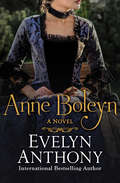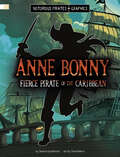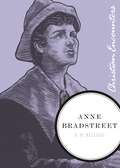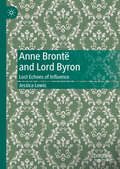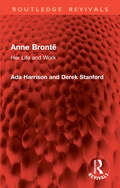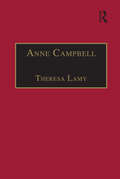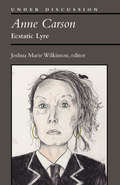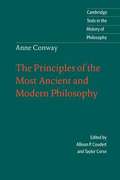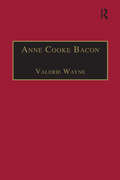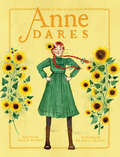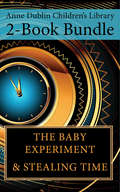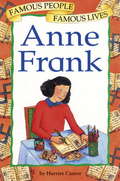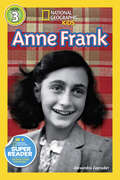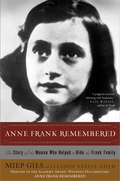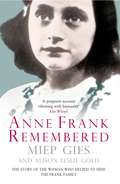- Table View
- List View
Anne Boleyn: A Novel (Grandes Novelas Ser.)
by Evelyn AnthonySet against the intrigue and pageantry of the sixteenth-century English court, Evelyn Anthony's novel tells the love story of Henry Tudor and Anne Boleyn, who would become his wife, his queen, and the mother of one of Britain's greatest monarchs On a lovely midsummer afternoon, Henry Tudor rides to Hever Castle. There, he feasts his eyes on Anne Boleyn, who caught his roving attention at court a few months earlier. Anne is in no mood to receive her king. He has torn from her the one man she loved: Harry Percy, who was forced to marry another. But King Henry VIII is not a man who gives up--the thrill of the chase only excites him more. Yet the woman he desires so passionately is no fool. Educated at the French court, Anne vows that she will not share the fate of her naïve younger sister, Mary, who after bearing Henry a bastard son was cast away and married off to a country squire. No, Anne will settle for nothing less than the crown of England, even if Henry has to break with Rome in order to marry her. History comes thrillingly alive in a novel that features a teeming canvas of iconic real-life characters: Cardinal Thomas Wolsey, the enemy Anne vows to destroy; Henry's first wife, the proud and pious Queen Catherine of Aragon; and Thomas Cromwell, who engineers Anne's downfall. From the halcyon early days of courtship to her imprisonment in the palace tower for treason, this is a tale of love, ambition, and the tragic destiny of Anne of the Thousand Days.
Anne Bonny's Wake: Maggie And Hersh Adventure Series (Maggie and Hersh #1)
by Dick ElamThis 1980s Carolina coast thriller &“channels all the danger, intrigue, and thrills of a pirate&’s life at sea for a twentieth-century criminal mystery&” (Forward Reviews).On an old sailboat named for his departed wife—as well as a legendary pirate—criminal justice professor Hershel Barstow is saying his final goodbye with a trip through the North Carolina Intercoastal Waterway. He expects his solo trip aboard the Anne Bonny to be a quiet one. Then the mysterious and seductive Maggie Adelaide Moore appears in the water and climbs aboard. His reluctant offer to help the distressed woman soon brings trouble, entangling Hershel with a dangerous drug cartel. Now Hershel needs to call on old friends from his CIA days to stay safe and riddle out Maggie's mysterious past. In the weathered Anne Bonny, enemies could be lurking behind every river bend. Now Hershel must navigate his way through deadly waters on a quest for truth, safety, and justice.
Anne Bonny, Fierce Pirate of the Caribbean
by Jessica GundersonAnne Bonny was not content with leading the demure life expected of ladies in the early 1700s. Instead, she defied her father, left her husband, and joined a pirate crew! Raiding ships in the Caribbean, she made a name for herself as a fierce fighter and became one of the few female pirates known to history. With accessible hi-lo text, dynamic art, and fast-paced storytelling, at-level and struggling readers alike can learn about Anne’s adventures in this graphic novel filled with schemes, plunder, and more.
Anne Bradstreet (Christian Encounters Series)
by D. B. KelloggChristian Encounters, a series of biographies from Thomas Nelson Publishers, highlights important lives from all ages and areas of the Church. Some are familiar faces. Others are unexpected guests. But all, through their relationships, struggles, prayers, and desires, uniquely illuminate our shared experience When she arrived in the New World at eighteen, Anne Bradstreet was a reluctant passenger:her old, comfortable lifestyle in England was quickly dashed against the rocks of the MassachusettsBay. While the wilderness of America and the drama of establishing the Massachusetts Bay Colony at times overwhelmed her, she always took refuge in the belief that it was God's plan. Anne respected the Puritan teachings and followed them her entire life, always searching for God's hand in everything around her. But she also was inspired by a strong female leader of the day, Queen Elizabeth, andthis influence taught Anne to push herself beyond the day's limitations. She managed her home, educated her children, encouraged her husband, and sought her Lord--all with a poet's heart.
Anne Brontë and Lord Byron: Lost Echoes of Influence
by Jessica LewisThis book explores the relationship between Anne Brontë’s work and the life and writings of Lord Byron. Byron’s influence on the other Brontë siblings is well-documented but absent in Anne’s history. Building on recent discourses of rich intertextuality in Anne’s work, Jessica Lewis reveals her relationship with the poet as significantly different from that of her siblings. Instead of trying to emulate Byron or derive inspiration from the concept of ‘mix’d essences’ or elemental affinity, Anne’s relationship with him is grounded in their shared Calvinistic upbringing and a rejection of its stringent principles, which propels both writers to positions of contemporary religious controversy. This volume reappraises Anne Brontë and her work in light of significant Byronic influence, and provides new readings of her novels and poetry.
Anne Brontë: Her Life and Work (Routledge Revivals)
by Derek Stanford Ada HarrisonAlthough the Brontë story had been told many times, originally published in 1959, Ada Harrison and Derek Stanford wrote the first book to be devoted entirely to the life and work of Anne. The youngest of the three famous sisters, Anne was too often regarded as a mere appendage to the more spectacular Emily and Charlotte. Yet her work has stood the test of time no less than theirs. ‘If Anne Brontë had lived ten years longer,’ wrote George Moore, the first important critic to establish a claim for Anne as a writer of consequence, ‘she would have taken a place beside Jane Austen, perhaps even a higher place.’ It is in the light of such statements as this that the authors wrote their critical biography, showing the shy but engaging third sister as a writer and a character in her own right.The story of Anne’s life is told by Ada Harrison, who unfortunately did not live to see proofs of this book; the assessment of Anne’s verse and fiction is undertaken by the poet and critic, Derek Stanford. The issues they raise, and their general conclusions, may be regarded as controversial; but not only have they made a number of original points in this first book on Anne, they have also, by moving the spotlight, shed fresh illumination on the whole Brontë picture.
Anne Byrn Saves the Day! Cookbook: 125 Guaranteed-to-Please, Go-To Recipes to Rescue Any Occasion
by Anne ByrnIt’s Anne Byrn to the rescue! A problem-solver extraordinaire, Anne Byrn knows what every too-busy cook knows. There are a gazillion recipes in the world, but the right recipe, the recipe that always works, the lifesaving recipe for when times are crazy—that’s priceless. Save the Day! Cookbook presents 125 of these guaranteed tried-and-true recipes for every occasion. Whether they are Anne Byrn’s own family favorites or collected from her network of fans across the country, these go-to recipes include easy appetizers for a party or potluck—Bacon and Cheddar Torte, Stuffed Jalapen~o Peppers Witowski; mains to feed a family or a crowd, from fast-to-fix Shrimp and Cheese Grits to do-ahead, no-fuss Ina’s Sweet- and-Sour Brisket; salads perfect for entertaining the book club, including Grilled Tuna Salade Nic¸oise and Libby’s Avocado and Pink Grapefruit Salad; sides that please everyone; and desserts that don’t take a week to assemble, like Veronica’s Mocha Cake, Lemon Snow Pudding, Ella’s Easy Peach Pie. Upbeat in attitude (it’s going to be okay, really!) and with full-color photos throughout, the Save the Day! Cookbook will be one that readers will turn to again and again. And for not only its recipes but its ideas too, including money-saver tips, menu and serving suggestions, “Razzle-Dazzle” variations, do-ahead notes, and much more. Your day is saved. And you’re welcome.
Anne Campbell: Printed Writings 1500–1640: Series I, Part Four, Volume 4 (The Early Modern Englishwoman: A Facsimile Library of Essential Works & Printed Writings, 1500-1640: Series I, Part Four)
by Theresa LamyThe religious, historical and rhetorical significance of the Confessions written by St. Augustine, Bishop of Hippo, can hardly be overstated: the book is one of the unifying texts of Western Christianity and a seminal work for Roman Catholic Europe. The publication in 1622 of Duchess Anne Campbell's selections in Spanish of parts of Augustine's Confessions has been little remarked, in part at least because of the obscurity of her feat. Yet Campbell's work is worthy of attention because of the evidence it gives of one woman's education and literary interests.
Anne Carson: Ecstatic Lyre
by Joshua Marie WilkinsonAnne Carson's works re-think genre in some of the most unusual and nuanced ways that few writers ever attempt, from her lyric essays, enigmatic poems, and novels in verse to further forays into video and comics and collaborative performance. Carson's pathbreaking translations of Ancient Greek poetry and drama, as well as her scholarship on everything from Sappho to Celan, only continue to demonstrate the unique vision she has for what's possible for a work of literature to become. Anne Carson: Ecstatic Lyre is the first book of essays dedicated to the breadth of Anne Carson's works, individually, spanning from Eros the Bittersweet through Red Doc. With contributions from Kazim Ali, Dan Beachy-Quick, Julie Carr, Harmony Holiday, Cole Swensen, Eleni Sikelianos, and many others (including translators, poets, essayists, scholars, novelists, critics, and collaborators themselves), we learn from Carson's greatest admirers and closest readers about the books that moved and inspired them.
Anne Conway: The Principles of the Most Ancient and Modern Philosophy
by Karl Ameriks Desmond M. Clarke Anne Conway Allison P. Coudert Taylor CorseAnne Conway was an extraordinary figure in a remarkable age. Her mastery of the intricate doctrines of the Lurianic Kabbalah, her authorship of a treatise criticising the philosophy of Descartes, Hobbes, and Spinoza, and her scandalous conversion to the despised sect of Quakers indicate a strength of character and independence of mind wholly unexpected (and unwanted) in a woman at the time. Translated for the first time into modern English, her Principles of the Most Ancient and Modern Philosophy is the most interesting and original philosophical work written by a woman in the seventeenth century. Her radical and unorthodox ideas are important not only because they anticipated the more tolerant, ecumenical, and optimistic philosophy of the Enlightenment, but also because of their influence on Leibniz. This fully annotated edition includes an introduction which places Conway in her historical and philosophical contexts, together with a chronology of her life and a bibliography.
Anne Cooke Bacon: Printed Writings 1500–1640: Series I, Part Two, Volume 1 (The Early Modern Englishwoman: A Facsimile Library of Essential Works & Printed Writings, 1500-1640: Series I, Part Two #Vol. 1)
by Valerie WayneAnne Cooke Bacon was highly educated and was known for her ability to read Latin, Greek, Italian and French. She married Sir Nicholas Bacon, Queen’s Keeper of the Great Seal and a member of Elizabeth’s Privy Council. The directions of the new Church of England were heavily influenced by her husband and Anne too was actively involved in the religious controversies of her day, her translations position her as a strong advocate for the Protestant cause. Whilst in her early 20s she translated the sermons of Bernardino Ochino, a popular Italian preacher who converted to Calvinism. Her translations were printed in four different volumes of Ochino’s sermons (between 1548 and 1570) although the publishers of these editions did not always see fit to name her as the translator. Translations by R. Argentyne were often included in the volumes and, in the earlier editions, he was credited with her work. The text reproduced here comes from the 1551 edition of Fouretene sermons of Barnardine Ochyne ... translated by AC as it not only includes Anne’s dedication to her mother and a preface in praise of Anne’s work but is the only edition of more than five sermons that does not also reprint translations by Argentyne. As an appendix to the present volume the five sermons translated by AC in the 1551 edition of Certayne sermons of the ryghte famous and excellent clerke ... are included. These five plus the fourteen reprinted in the body of this book constitute all of the sermons that Anne Cooke is known to have translated and published. In 1562 John Jewel’s Apologia ecclesiae anglicanae was published in England and was viewed as the authoritative defence of the English Church. Anne Cooke Bacon’s translation of it was published in 1564 and became the official English version. The text reprinted here is unusually clear and also has the advantage of including an engraving of Lady Bacon.
Anne Dares: Inspired by Anne of Green Gables (An Anne Chapter Book #5)
by Kallie GeorgeThe fifth book in an early chapter book series inspired by Anne of Green Gables, starring the spirited Anne Shirley as she agrees to a dangerous dare and learns a valuable lesson about courage.Anne is excited to be a guest at a party at Orchard Slope, the home of her kindred spirit, Diana Barry. But when the dares start and mean Josie Pye makes the others feel bad, Anne can't stop herself from challenging Josie to a dare . . . which leads to Anne being dared to climb the house and walk along the ridgepole! Anne's dangerous dare ends in injury . . . and teaches her an important lesson. But Anne must pluck up her courage again when she is chosen to recite at a Christmas concert! How can Anne perform in front of so many people? And what is shy Matthew Cuthbert hiding from the family?Lovingly adapted by Kallie George with beautiful nostalgic illustrations by Abigail Halpin, this series is perfect for fans of Anne, new and old.
Anne Dreams: Inspired by Anne of Green Gables (An Anne Chapter Book #6)
by Kallie GeorgeThe sixth and final book in an early illustrated chapter book series inspired by Anne of Green Gables, starring the spirited Anne Shirley as she pursues her dream of becoming a teacher.Anne is starting to grow up, but she's still disappointed with her red hair — it's one of her lifelong sorrows. One day, she buys a bottle of hair dye in order to have raven black hair like her best friend and kindred spirit, Diana. Unfortunately, the dye ends up turning her hair green! This upset causes Anne to start focusing on improving herself inside, rather than her looks . . . and leads to a new dream taking shape: Anne wanting to become a teacher! She joins a club for students studying to get into Queen's College. But can Anne overcome her fear of failing? And how can she study hard when pesky Gilbert is distracting her?Lovingly adapted by Kallie George with beautiful nostalgic illustrations by Abigail Halpin, this series is perfect for fans of Anne, new and old.
Anne Droyd and Century Lodge
by William HadcroftGezz and her best friends Malcolm and Luke are having fun on the housing estate where they live when the arrival of a stranger interrupts their everyday lives and changes the world as they know it forever. Created by a professor of robotics, Anne Droyd is left in the care of these three children, who take her to school with them and teach her how to be 'a human'. This imaginative tale packed full of heroic characters and Asperger adventure is suitable for children aged 9 and over.
Anne Dublin Children's Library 2-Book Bundle: Stealing Time / The Baby Experiment
by Anne DublinFrom the imagination of Anne Dublin come two novels for young people, exploring incredible moments in history. Includes: The Baby Experiment In the early 18th century in Hamburg, Germany, Johanna gets a job as a caregiver at an orphanage. Until it's too late, she doesn't realize a secret experiment is taking place that results in the deaths of babies. Johanna decides to kidnap one of the orphanage's babies and escape with her to Amsterdam. Stealing Time Jonah Wiley is having a hard enough time adjusting to his parents' divorce, and when his mom goes to a conference — leaving him with his dad and stepmother — it only makes things worse. Now thanks to a strange pocket watch he and his stepbrother are trapped in time, racing to overcome tough challenges in order to get home.
Anne F. Baird
by Leslie A. Perlow Thomas J. DelongPresents profiles written by six members of the HBS Class of 1976 from the 10th and 20th reunions. The six alumni represent a cross section of the class of 1976 and provide a snapshot of life at the time of the reunions.
Anne Frank
by Alison Kelly Susanna Davidson Eva SchlossLearn more about Anne Frank's life before she went into hiding with her family.
Anne Frank
by Anne SchraffAnne and her family moved to Amsterdam in 1933 after the Nazis gained power in Germany. She wrote a diary, which records her life from 12 June to 1 August 1944. Anne Frank died in early 1947
Anne Frank
by Kem Knapp SawyerTells the incredible story of this courageous young writer. In this groundbreaking new series, DK brings together fresh voices and DK design values to give readers the most information-packed, visually exciting biographies on the market today. Full-color photographs of people, places, and artifacts, definitions of key words, and sidebars on related subjects add dimension and relevance to stories of famous lives that students will love to read.
Anne Frank (Famous People, Famous Lives #7)
by Harriet CastorWhen Anne Frank is given a diary, she starts to write to her made-up friend, Kitty. But during World War II Anne and her family are forced to hide from the Nazi Germans. Find out all about the diary of Anne Frank with this story that is packed with all the facts and colourful pictures. This book is part of a series of books, Famous People, Famous Lives, which are suitable for ages 6-12. They tell the stories of famous men and women and great events in history. Written by successful authors, they are enjoyable reads which are packed with facts and illustrations.
Anne Frank (Famous People, Great Events #1)
by Harriet CastorWhen Anne Frank is given a diary, she starts to write to her made-up friend, Kitty. But during World War II Anne and her family are forced to hide from the Nazi Germans. Find out all about the diary of Anne Frank with this story that is packed with all the facts and colourful pictures. This book is part of a series of picture books, Famous People, Great Events, which are suitable for ages 6-12. They tell the stories of famous men and women and great events in history. Written by successful authors, they are enjoyable reads which are packed with facts and colourful illustrations.Each book includes a timeline of key dates, a quiz and index.
Anne Frank (Life And Times)
by Richard TamesTraces the life of a Jewish girl who chronicled her day-to-day life in a diary as she hid in an attic in Nazi-occupied Holland for two years.
Anne Frank (National Geographic Kids Readers)
by Alexandra ZapruderAnne Frank is one of the first of many National Geographic Readers that highlight important historical figures. This level-3 reader brings an understanding of her historical significance to a whole new audience. Young readers will learn about the brave and tragic life of the young girl whose diary kept while in hiding from Nazis is one of the most important and insightful books of the World War II era. National Geographic Readers: Anne Frank explores not just the diary, but her life and the important role she played in 20th-century history.
Anne Frank Remembered
by Miep Gies Alison Leslie GoldShe found the diary and brought the world a message of love and hope. It seems as if we are never far from Miep's thoughts....Yours, Anne For the millions moved by Anne Frank: The Diary of a Young Girl, here at last is Miep's own astonishing story. For more than two years, Miep Gies and her husband helped hide the Franks from the Nazis. Like thousands of unsung heroes of the Holocaust, they risked their lives each day to bring food, news, and emotional support to the victims. From her own remarkable childhood as a World War I refugee to the moment she places a small, red-orange, checkered diary -- Anne's legacy -- in Otto Frank's hands, Miep Gies remembers her days with simple honesty and shattering clarity. Each page rings with courage and heartbreaking beauty.
Anne Frank Remembered
by Miep GiesFor more than two years, Miep and her husband helped hide the Franks from the Nazis. Like thousands of unsung heroes of theHolocaust, they risked their lives every day to bring food, news, and emotional support to its victims.
